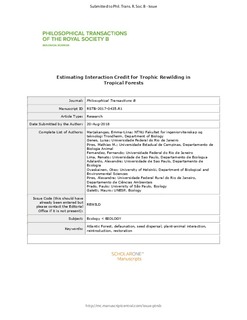| dc.contributor.author | Marjakangas, Emma-Liina | |
| dc.contributor.author | Genes, Luísa | |
| dc.contributor.author | Pires, Mathias M. | |
| dc.contributor.author | Fernandez, Fernando A.S. | |
| dc.contributor.author | de Lima, Renato A.F. | |
| dc.contributor.author | de Oliveira, Alexandre A. | |
| dc.contributor.author | Ovaskainen, Otso | |
| dc.contributor.author | Pires, Alexandra S. | |
| dc.contributor.author | Prado, Paulo I. | |
| dc.contributor.author | Galetti, Mauro | |
| dc.date.accessioned | 2019-04-23T09:16:04Z | |
| dc.date.available | 2019-04-23T09:16:04Z | |
| dc.date.created | 2019-01-17T11:22:56Z | |
| dc.date.issued | 2018 | |
| dc.identifier.citation | Philosophical Transactions of the Royal Society of London. Biological Sciences. 2018, 373 (1761), . | nb_NO |
| dc.identifier.issn | 0962-8436 | |
| dc.identifier.uri | http://hdl.handle.net/11250/2595003 | |
| dc.description.abstract | Trophic rewilding has been suggested as a restoration tool to restore ecological interactions and reverse defaunation and its cascading effects on ecosystem functioning. One of the ecological processes that has been jeopardized by defaunation is animal-mediated seed dispersal. Here, we propose an approach that combines joint species distribution models with occurrence data and species interaction records to quantify the potential to restore seed-dispersal interactions through rewilding and apply it to the Atlantic Forest, a global biodiversity hotspot. Using this approach, we identify areas that should benefit the most from trophic rewilding and candidate species that could contribute to cash the credit of seed-dispersal interactions in a given site. We found that sites within large fragments bearing a great diversity of trees may have about 20 times as many interactions to be cashed through rewilding as small fragments in regions where deforestation has been pervasive. We also ranked mammal and bird species according to their potential to restore seed-dispersal interactions if reintroduced while considering the biome as a whole and at finer scales. The suggested approach can aid future conservation efforts in rewilding projects in defaunated tropical rainforests. | nb_NO |
| dc.language.iso | eng | nb_NO |
| dc.publisher | The Royal Society | nb_NO |
| dc.title | Estimating interaction credit for trophic rewilding in tropical forests | nb_NO |
| dc.type | Journal article | nb_NO |
| dc.type | Peer reviewed | nb_NO |
| dc.description.version | acceptedVersion | nb_NO |
| dc.source.pagenumber | 8 | nb_NO |
| dc.source.volume | 373 | nb_NO |
| dc.source.journal | Philosophical Transactions of the Royal Society of London. Biological Sciences | nb_NO |
| dc.source.issue | 1761 | nb_NO |
| dc.identifier.doi | 10.1098/rstb.2017.0435 | |
| dc.identifier.cristin | 1659132 | |
| dc.description.localcode | © 2018 The Author(s). Preprints and postprints may be deposited at any time and made freely available, but is embargoed until the day of publication - 22 October 2018. | nb_NO |
| cristin.unitcode | 194,66,10,0 | |
| cristin.unitcode | 194,63,15,0 | |
| cristin.unitname | Institutt for biologi | |
| cristin.unitname | Institutt for matematiske fag | |
| cristin.ispublished | true | |
| cristin.fulltext | postprint | |
| cristin.qualitycode | 2 | |
